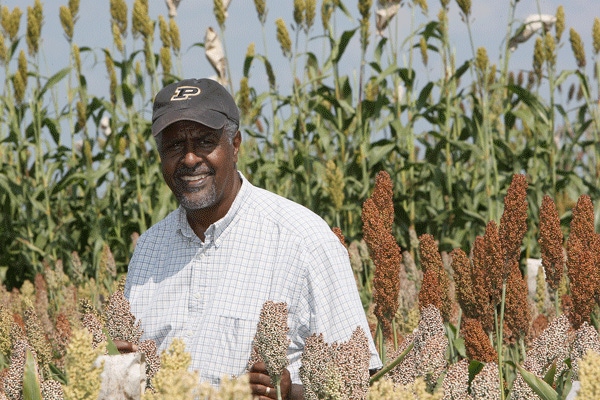March 25, 2011

Purdue University has established the Center for Global Food Security to take up one of the world's most pressing challenges: getting enough food to people who need it the most today and producing enough to meet even greater demand in years to come.
The center, a year in the making, has begun operations at the university's Discovery Park, a $500 million complex of organizations leading large-scale collaborative research efforts on campus. "We are looking not only at food, agriculture and natural resource solutions for today but also for future generations," said the center's executive director, Gebisa Ejeta, Distinguished Professor of Agronomy and a 2009 World Food Prize laureate. "We must define what our legacy will be."
The issue of food security is a deepening global concern as the need for more food continues to increase with a rapidly growing world population. About 1 billion of the world's nearly 7 billion people suffer from chronic hunger because of economic, social, political and environmental conditions. Scientists project that agriculture will need to double plant and animal production by 2050, producing it more efficiently and safely on less farmland, to meet the needs of a population expected to reach 9 billion people.
University President France A. Córdova said the center's mission embraces objectives in Purdue's "New Synergies" strategic plan for large-scale partnerships with public and private enterprises to conduct multidisciplinary research that meets needs of a global society.
"Food security is critical to the future of all our lives, here in the United States and around the world," Córdova said. "Addressing the challenge of food security will require a sustained research commitment to science, technology and innovation on a wide range of issues, such as plant genetics, crop and animal husbandry and policy analysis, and mitigating problems of climate change, global water shortages and land management. The challenge is one that Purdue is highly qualified to take on."
Greater investment in research is needed to examine how to meet the "food, feed and fuel needs of humanity" as Ejeta puts it — food for people, feed for livestock and fuel such as corn-based ethanol for vehicles. "We cannot provide for all with the knowledge and resources we have today," Ejeta said. "Our food and natural resources problems are getting more complicated. New science, technology and innovations will be needed. Furthermore, single-discipline solutions are not going to get it done. We need more integrated and holistic approaches to research."
Purdue's initiative builds upon the university's wide range of expertise in food production, protection, preservation and economics as well as related areas such as climate change, energy, and environmental and natural resources. It also reflects Purdue's land-grant mission of learning, discovery and engagement. The center will draw on leadership of faculty, staff and students from colleges and schools across the university's campus and will support initiatives of Purdue's Global Policy Research Institute involving agriculture, the environment and the economy.
Purdue's interest in the issue of global food security was demonstrated at a February 2010 conference during which more than 70 faculty members from Purdue discussed how the university should position itself to help fight global hunger.
Planning additional programs
The center is planning additional programs to raise awareness about the issue of food security and to find solutions. A lecture series begins April 4, featuring Roger Thurow, senior fellow for global agriculture and food policy at The Chicago Council on Global Affairs. As a Wall Street Journal foreign correspondent, Thurow and colleague Scott Kilman in 2003 wrote a Pulitzer Prize-finalist series of stories on famine in Africa. They are authors of the book "Enough: Why the World's Poorest Starve in an Age of Plenty."
The lecture will be at Fowler Memorial House, 1200 W. State St. on campus, starting at 7 p.m. The first 100 people to arrive for the lecture will receive a free copy of the book.
"We find ourselves at a moment of great opportunity in the battle against hunger, and we dare not squander it," Thurow said. "It is time to raise the clamor and make ending hunger through agriculture development the great populist cause of this decade."
The center also will host an international workshop of scientists May 23-24 to begin a pilot project aimed at improving a global, open-source database for analysis of agriculture, land use and the environment.
A website for the center has been established at http://www.purdue.edu/dp/food. Ejeta, a native of Ethiopia, received the 2009 World Food Prize for his work in developing sorghum varieties resistant to drought and the parasitic weed Striga. His research dramatically increased the production and availability of sorghum for hundreds of millions of people in Africa, where it is a major crop. Sorghum is among the world's five principal grains.
Ejeta is Purdue's second World Food Prize laureate. Philip E. Nelson received the award in 2007 for his aseptic processing innovation. The system revolutionized food trade by reducing postharvest waste and making seasonal fruits and vegetables available year-round and easier to transport worldwide.
Ejeta in September was appointed a science envoy for the U.S. State Department. Science envoys collaborate on programs that develop new sources of energy, create "green" jobs, digitize records, clean water and grow new crops in developing countries.
You May Also Like




